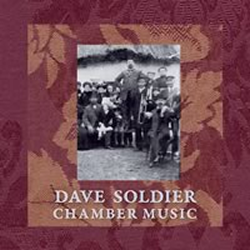Dave Soldier
"Chamber Music"

$13.99 | CD | Catalog #MUL014
Release date: January, 2007
MP3s:
East St. Louis, 1968 (for viola and electronics)
Reverie (first movement from Duo Sonata for Violin & Cello)
Gigue (from Utah Dances for solo saxophone)
Named as one of the best classical CDs 0f 2007 by the New
York Times.
A two CD collection with two hours of pieces written for classical
musicans by Dave Soldier written over the past twenty years. Features
many outstanding players from the world of contemporary classical
music, including violinists Regina Carter, Laura Seaton, and Rebecca
Cherry, flute virtuoso Robert Dick, organist Walter Hilse, violist
Richard Auldon Clark, accordionist William Schimmel, sax player
Michael Swartz, and cellist Erik Friedlander.
Among the pieces are East St. Louis, 1968, written for electronics,
samples, and viola. The music portrays an adventure of a young viola
player on his first trip to that city.
Hockets and Inventions are two and three part inventions performed
here by Walter Hilse on the church organ.
One thing about having an approach as idiosyncratic as Dave Soldier's is that once listeners know your work at all, they realize that coming to new works with any expectations about style, form or language is fruitless. As this expertly played sampler of his chamber music shows, Mr. Soldier is all over the muscial map, and this is only part of the picture. Absent are his music for elephant orchestra, his quasi-operatic dramas and his unalloyed rock music.
Not to make it sound too limited. Mr. Soldier's Duo Sonata (1988) for violin and cello veers from Grapelli-style blues-tinted jazz to the gentility of 19th century salon music, before diving into a quick hoe-down section and scurrying back to the blues. "Sontag in Sarajevo" (1994) draws on similar influences, with polkas and soaring art-rock guitar solos added to the agenda. Mr. Soldier's trick is to make it all sound coherent.
An arch humor drives "East St. Louis 1968" (1999), essentially a dance track for viola, electronics, found sounds (a preacher and a crowd, children's playground chants) and harmonica. Here and in the zany "To Spike Jones in Heaven" (1989), a showpiece for the accordionist William Schimmel, bizzare juxtaposition is everything.
But Mr. Soldier's soberer side is represented as well. The "Utah Dances" (1990) for solo saxophone; "Little Andre" (1986), for solo flute; annd "Hockets and Inventions" (1989) , for organ, are richly detailed, virtuosic suites. The rhythmic twists in "Clever Hans" (2006) , a neo-Baroque ballet suite for violin, cello, and harpsichord, are clearly built for choreography, but the work stands nicely on its own. And "The Unfolding Opium Poppy" (1996), for violin and piano, builds from dark plaintive introspection to a level of searing passion that makes it the most striking work here.
-Allan Kozinn, Arts & Leisure, April 22, 2007
On Utah Dances (reviewed by the great pianist Blue Gene Tyranny for allmusic.com) "This delightful suite of 5 dances was written for composer Otto Luening's 90th birthday and can be played on flute or many other woodwinds (one especially fine recorded performance has been made on alto saxophone). The suite, of approximately 11 1/2 minutes total duration, is a wonderful study in pure melodic writing. " (read entire review)
Review from Metropolis magazine
Review from Allmusic.com
More about Dave Soldier